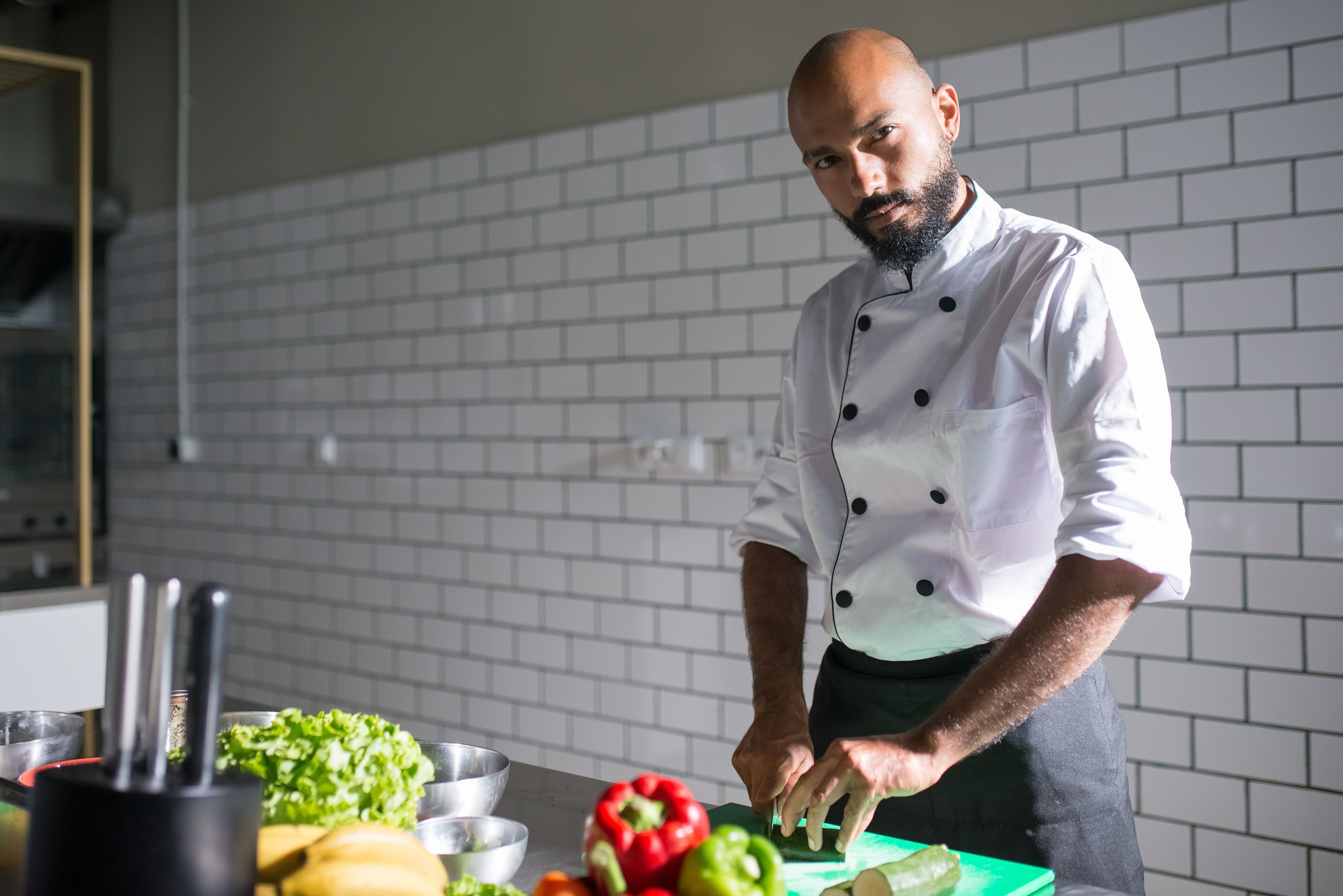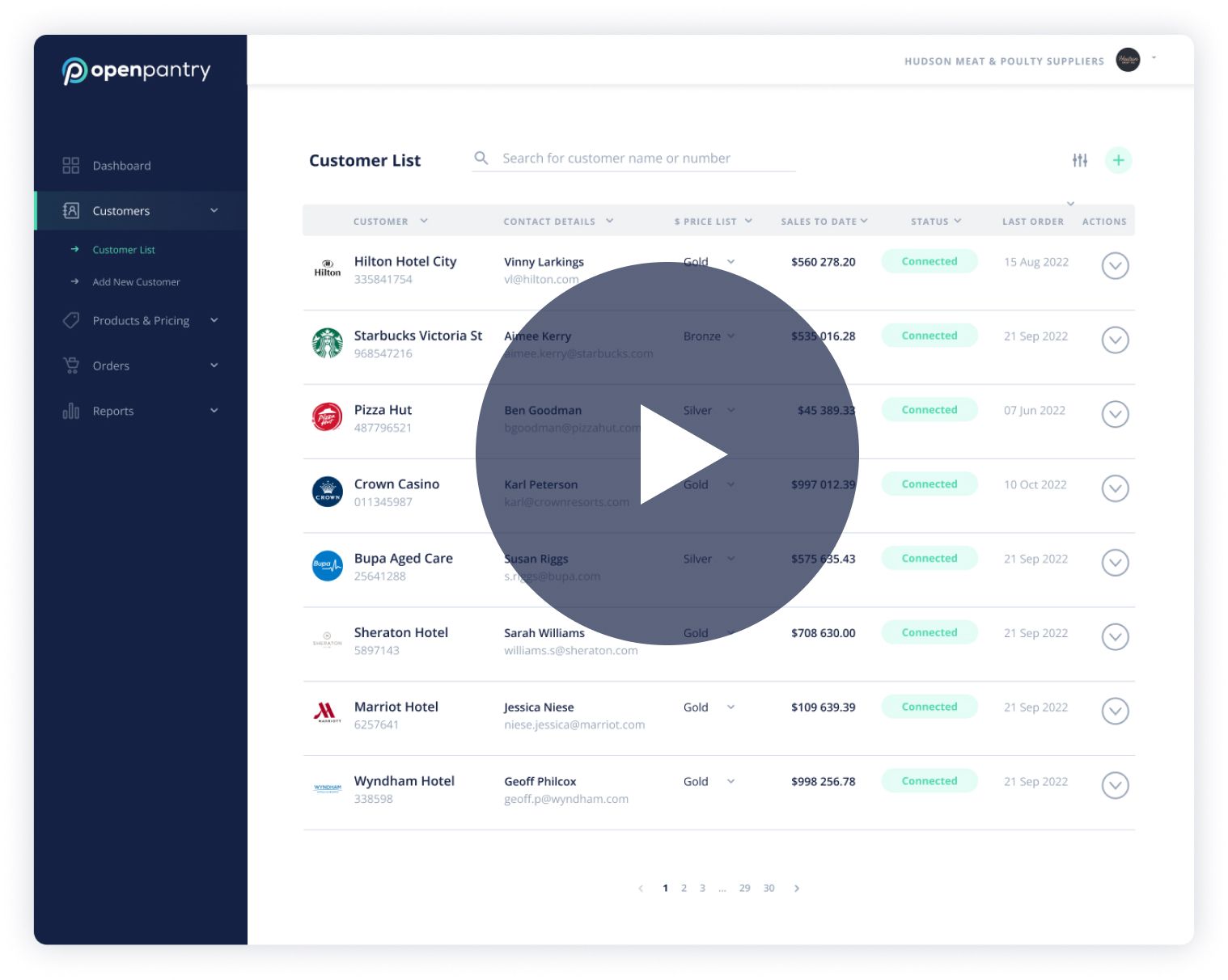Strategies to Grow Your Wholesale Food & Beverage Supply Business

In the competitive food and beverage supply industry, leveraging a robust wholesale online ordering system for restaurants and suppliers, is pivotal for understanding and meeting restaurants' and chefs' distinctive needs and preferences. This article unfolds invaluable insights from eminent chefs Ishy and Andrew. It offers a roadmap for suppliers to refine their strategies and operations, fostering growth and fortifying relationships with clients in the B2B wholesale marketplace.
This piece probes the chefs’ perspectives, delineating how suppliers can elevate their services, bolster their reputations, and broaden their wholesale food and beverage supply ventures. By synchronising with the values and anticipations of chefs and restaurants, suppliers can traverse the intricacies of the sector and unveil novel avenues for innovation and triumph in the food ordering system landscape.
Understanding the Chef’s Perspective:

1. Valuing Honesty and Communication:
Melbourne-based chefs Ishy Patel and Andrew Braham value honesty and open communication immensely. They appreciate suppliers who promptly inform them about out-of-stock items or unforeseen price changes. This transparency allows chefs to make informed decisions and adjustments, ensuring the smooth operation of their kitchens. Maintaining clear and consistent communication is crucial for suppliers, as it builds trust and fosters a sense of reliability, essential components in establishing long-lasting relationships with clients.
2. Reliability and Reputation:
A supplier’s reliability and reputation are paramount in the eyes of chefs. They seek suppliers who consistently deliver high-quality products and are willing to work through challenges to meet their needs. A good reputation, built on reliability and customer satisfaction, makes a supplier stand out and is often a deciding factor for chefs when choosing their partners in supply.
3. Emphasis on Quality and Provenance:
Quality is non-negotiable. Both chefs stress the importance of high-quality ingredients and a strong emphasis on provenance. Knowing the origin of the products and how they are produced is becoming increasingly important in the culinary world. Suppliers prioritising these values and providing products with clear provenance and superior quality are more likely to be favoured.
4. The Importance of Strong Rapport:
Building and maintaining a strong rapport with clients is a cornerstone of the supplier-chef relationship. Personal touches like sales representatives calling to discuss new products and build relationships are highly valued. These interactions cultivate a sense of partnership and mutual growth, making chefs more inclined to maintain and strengthen the relationship.
5. Adaptability and Meeting Needs:
The culinary landscape is ever-evolving, and adaptability is critical. Suppliers must be willing to evolve and adapt their offerings to meet chefs' changing needs and preferences. Suppliers must be flexible and accommodating, whether offering samples, discussing pricing options based on quantity, or providing unique or exclusive products.
6. Ethical Practices and Sustainability:
Andrew, in particular, values ethical farming practices and sustainability, preferring suppliers who align with these values. The emphasis on ethical and sustainable practices is not just a trend but a fundamental shift in the industry, and suppliers who embrace this shift are more likely to succeed in the long run.
7. Efficiency through Technology:
Andrew highlights the importance of leveraging technology to track pricing efficiently through online ordering systems and to receive savings, rebates, and discounts. Suppliers incorporating technology to streamline their operations and offer efficient solutions are perceived as more modern and likely to attract clients who value convenience and efficiency.
8. Negotiation and Competitive Pricing:
Both chefs value the ability to negotiate prices and the availability of competitive pricing strategies. Suppliers who offer different pricing options and are open to negotiations are more likely to build successful relationships with chefs. Additionally, offering opportunities for smaller portions can help reduce waste and promote cost savings, aligning with the growing emphasis on sustainability in the industry.
Strategies for Suppliers to Grow Their Business:

1. Champion Transparency and Fluid Communication:
Suppliers must enshrine transparent and candid communication, swiftly notifying clients of any alterations or disruptions in supply. This openness cultivates trust and dependability—key to sustaining enduring relationships with chefs and restaurant proprietors. Periodic interactions and updates are instrumental in developing rapport and discerning clients' dynamic needs in the B2B order management sphere.
2. Preserve Reputation through Uniformity and Excellence:
Upholding an impeccable reputation is crucial and achievable through the unwavering delivery of premium products and a readiness to overcome challenges to satisfy client requisites. A commitment to the quality and origin of products distinguishes suppliers, meeting the escalating demand for meticulously sourced and top-tier ingredients.
3. Harness Technology for Streamlined Operations:
Integrating technology, including sales order management software, profoundly augments operational efficacy and client service. Online ordering platforms and automated order processing refine workflows, diminish manual interventions, and facilitate concentrated endeavours on relationship cultivation and business expansion. This technological embrace renders suppliers appealing to contemporary restaurants and chefs prioritising convenience and efficiency.
4. Cultivate Robust Relationships and Personal Connections:
Nurturing profound relationships with clients is imperative. Personalised engagements, like discussions on new products, foster a sense of collaboration and collective advancement. A nuanced understanding of each client’s preferences enables suppliers to tailor their offerings and services, enhancing their stance in the B2B wholesale marketplace.
5. Offer Competitive and Flexible Pricing:
Providing competitive pricing and flexible options is critical to attracting and retaining clients. Suppliers should be open to negotiations and offer various pricing strategies to accommodate the diverse needs of restaurants and chefs. Additionally, offering smaller portion options can align with sustainability goals and reduce waste, appealing to environmentally conscious clients.
6. Prioritize Sustainability and Ethical Practices:
Embracing sustainability and ethical practices can significantly impact a supplier’s appeal. Suppliers should seek to align with the values of chefs and restaurant owners who prioritise sustainability, offering products that are ethically sourced and environmentally friendly. This alignment not only meets the growing demand for sustainable options but also contributes to a positive brand image and long-term success.
7. Diversify Offerings and Adapt to Market Trends:
Staying informed about market trends and adapting offerings accordingly is essential. Suppliers should diversify their product range, offering speciality and exclusive products that attract premium clientele. Understanding and responding to shifts in consumer behaviour, such as the growing preference for locally sourced products, can open new opportunities and market segments.
8. Optimise Online Presence and Visibility:
A solid online presence is crucial in today’s digital age. Suppliers should optimise their websites for search engines, ensuring they rank high in relevant searches. Being listed online and maintaining active social media profiles can enhance visibility and attract potential clients. Positive online reviews and word-of-mouth recommendations can significantly impact a supplier’s reputation and client base.
9. Educate and Add Value:
Providing valuable insights and education to clients can set suppliers apart. Suppliers can offer advice on menu costing, food inventory management, and sustainable sourcing, helping clients navigate the complexities of the culinary industry. Adding value in this way can strengthen relationships and position suppliers as knowledgeable partners in the eyes of chefs and restaurant owners.
Leveraging Technology for Business Growth:

Suppliers aspiring to escalate their wholesale food and beverage supply ventures can leverage technology to realise their objectives, distinguishing themselves in the competitive B2B order management software domain. The deployment of sophisticated tools and systems optimises operations and offers unparalleled services.
Initiate by embracing sophisticated online ordering systems, refining the ordering experience for clients by mitigating errors and ensuring precise and prompt order realisation. Subsequently, streamline your order management with advanced sales order management software, liberating resources to concentrate on relationship-building and exploring new business horizons while minimising manual errors and enhancing service reliability.
Optimal food inventory management is also vital, necessitating the application of technology to maintain ideal stock levels and curtail holding expenses. This strategic alignment with demand patterns facilitates improved forecasting and planning, optimising the B2B order management process.
Margin-lock technology is another powerful tool that maintains consistent profit margins despite fluctuations in costs. This technology allows for flexible pricing that adapts to changes in costs, ensuring sustained profitability without sacrificing competitiveness.
At Open Pantry, we can assist you with all of the above. Contact us to learn more.
Remember to enhance your online presence by optimising your website and online profiles to rank higher in search engine results. Engage with potential clients on social media and regularly update your industry trends and offerings to boost your online visibility and brand image.
Offering value-added services like market trend insights, menu costing tools, and sustainable sourcing advice can strengthen your client relationships and position you as a knowledgeable and trustworthy partner in the culinary industry.
Finally, explore strategic partnerships with tech companies and platforms to open up new avenues for business growth. These partnerships can provide access to innovative solutions and a broader customer base, enabling you to stay ahead of the competition and meet the market's evolving needs.
By embracing technology, you can optimise your operations, offer enhanced services, and position yourself as a preferred partner for restaurants and chefs. Stay ahead of the curve by investing in continuous learning and development to improve your technological proficiency and adapt to the changing culinary landscape. The future of your business is bright with the power of technology on your side!
Building Strong Relationships with Chefs and Restaurants:

To develop and maintain strong relationships with chefs and restaurants, suppliers should prioritise honesty, communication, reliability, reputation, quality, consistency, provenance, ethical practices, value-added services, adaptability, and customer-centricity.
Suppliers should inform clients promptly about any issues, strive to meet their needs consistently, offer high-quality ingredients, prioritise sustainable sourcing, and offer value-added services such as menu costing tools and insights into market trends.
Adapting to Market Trends and Demands
In an ever-evolving industry, staying attuned to market trends and demands is crucial for suppliers aiming to stay ahead of the competition. By understanding and anticipating the needs and values of chefs, suppliers can tailor their offerings and strategies to become indispensable partners in the culinary journey.
1. Understanding Chef’s Needs and Values:
Chefs like Ishy and Andrew value honesty, communication, reliability, and a strong rapport with their suppliers. They appreciate proactive suppliers, are willing to work through challenges and maintain a personal touch in their interactions. By aligning with these values, suppliers can foster long-lasting relationships and become trusted partners for chefs.
2. Anticipating Market Demands:
The culinary world is dynamic, with changing consumer preferences and culinary trends. Suppliers need to stay informed about these changes and adapt their offerings accordingly. Whether it’s the rise of plant-based cuisine or the demand for locally sourced ingredients, suppliers who can anticipate and meet these demands are more likely to succeed in the competitive market.
3. Leveraging Technology and Innovation:
In today’s digital age, leveraging technology is not just a convenience; it’s a necessity. Suppliers embracing technology and innovation can streamline operations, offer better services, and adapt quickly to market changes. By integrating advanced solutions like online ordering systems and food inventory management software, suppliers can enhance their efficiency and meet the evolving needs of their clients.
Take your wholesale business to the next level with Open Pantry.

WATCH VIDEO ON HOW OPEN PANTRY CAN HELP YOUR BUSINESS ▶️
To all the innovative food and beverage suppliers out there, it’s time to elevate your game and become the preferred choice for chefs. Reach out to Open Pantry today and explore how integrating cutting-edge technology can streamline your workflows and ensure seamless operations, making you a standout choice for chefs and restaurateurs.
Leverage Margin-Lock Technology:
With Open Pantry, leverage the revolutionary margin-lock technology to assure more predictable profits, allowing you to navigate the fluctuating market confidently and precisely.
Streamline Your Operations:
Discover how Open Pantry can help you refine your operations, from inventory management to order processing, ensuring that you can focus on what you do best—supplying high-quality products.
Become a Preferred Supplier:
By aligning your operations with the values and preferences of chefs and by leveraging advanced technological solutions, position yourself as a preferred supplier, building long-lasting and fruitful partnerships with culinary maestros.
Reach Out and Elevate Your Business:
Don’t let the opportunity to redefine your business pass by. Reach out to Open Pantry and discover the myriad of ways in which you can elevate your business, ensuring you are not just a supplier but a valued partner in the culinary journey.